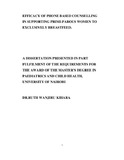| dc.contributor.author | Kihara, Ruth W | |
| dc.date.accessioned | 2013-05-24T13:23:13Z | |
| dc.date.available | 2013-05-24T13:23:13Z | |
| dc.date.issued | 2011 | |
| dc.identifier.citation | Master's degree in Paediatrics and child health | en |
| dc.identifier.uri | http://erepository.uonbi.ac.ke:8080/xmlui/handle/11295/25471 | |
| dc.description.abstract | Back ground: Although Exclusive breastfeeding has been shown to have great health
benefits to both mother and child, current rates of exclusive breastfeeding have
remained low especially in the developing countries. Frequent contact with an infant
feeding counselor has been the most effective method of increasing exclusive
breastfeeding in populations that traditionally breastfeed. Health systems in resource
constrained settings where the public health and individual benefits of exclusive
breastfeeding are highest do not have the resources to maintain a cadre of health
workers who visit all mothers of new born babies to support infant feeding. This
study evaluated phone based counseling as a strategy of supporting the primiparous
mothers to breast feed their infants exclusively. A recognized problem in assessing the
effect of lactation counseling is that the effect is based on mothers' self-reported
behavior, and it is a concern that mothers in the intervention group may over report
rates' of exclusive breastfeeding. This study was designed to measure breast-milk and
nonbreast-milk water intakes by using the dose-given-to-the-mother (dose-to-mother)
deuterium dilution technique and to validate reported exclusive breastfeeding in a
subgroup of mother-infant pair
Objective:To asses the efficacy of phone - based breastfeeding support among primi
parous women at Kenyatta National Hospital.
In a subset of the women, to evaluate the accuracy of self report by mothers on their
infant feeding practices by use of deuterium dilution technique.
Design: Randomized controlled study.
Methods: Subjects were drawn from Kenyatta National Hospital labour Ward and
randomly assigned to receive either phone based breastfeeding support or standard
health care messages. The group in the intervention arm received phone calls weekly
in the first month and fortnightly in the second and the third month. Data on infant
feeding practices was collected by use of the standard WHO questionaire at
scheduled MCH visits(6wks,1 Owks and 14wks).
In a subsample of 20 mothers infant pairs(mean infant age six weeks) who reported
exclusive breastfeeding by self report, intakes of breastmilk and non breastmilk were
measured to assess the validity of self report in reporting exclusive breastfeeding
Results: A total of 180 mother-baby pairs were enrolled into the study, 91 in the
ix
intervention ann and 89 controls. At 6 weeks 51(56 %) of the 91 women randomized
to the intervention showed up for the interview compared to 52 (58%) of 89 in the
control arm (p=0.881). A further 20 (22%) women in the intervention arm and 18
(20%) in control arm were interviewed over the phone. Overall at 6 weeks there was
interview data for 78% of the women in both the intervention and control arm. At 10
weeks 42 (46%) of 91 in intervention arm and 44 (49%) of 89 in control arm were
seen at 10 weeks.(p=0.659). A further 15 (16%) women in the intervention arm and
17 (19%) in the control arm were interviewed over the phone. Therefore interview
data at 10 weeks was available for 62% of the women in the intervention arm and 68%
in the control arm of the study. At 14 weeks 37(40%) of the 91 women in the
intervention arm and 40(45%) of the 89 in the control group were seen at 14 weeks
(P=0.S61).
Overall, high exclusive breastfeeding rates were achieved in the intervention arm.
Exclusive breastfeeding rates were 93% at 6, 90% at 10 and 87% at 14 weeks
postpartum and 72%,S8% and 4S% in the same time periods for the control babies.
The exclusive breastfeeding rates were significantly higher in the phone based
counselling group at all three points of evaluation (p value <O.OS ) .
Self reporting of exclusive breastfeeding was an inacurate method of obtaining
information on exclusive breastfeeding rates with the gold standard test using
deuterated water giving a positive predictive value of 20%.
Conclusion: Phone based counselling by a paediatric SHO resulted in > 90% EBF
rates up to 14 weeks, and significantly reduced child mortality.
Recommendations:
A repeat study to determine the efficacy of counselling by other health cadres in
supporting the mothers to breastfeed their infants exclusively should be done.
The hospital should consider designating a paediatrician or well trained paediatric
Clinical officer to do phone based counselling of mothers of newborns in the first six
weeks of life to improve breastfeeding and health seeking behaviour.
A larger study should be done focussing mainly on the cost implication and
feasibility of use of phone call in supporting breastfeeding mothers at a national
level. | en |
| dc.language.iso | en | en |
| dc.publisher | University Of Nairobi | en |
| dc.title | Efficacy of phone based counselling in supporting primi-parous women to Exclusively breastfeed | en |
| dc.type | Thesis | en |
| dc.description.department | a
Department of Psychiatry, University of Nairobi, ; bDepartment of Mental Health, School of Medicine,
Moi University, Eldoret, Kenya | |
| local.publisher | College of Health Sciences | en |

